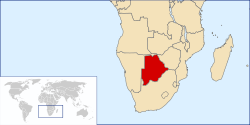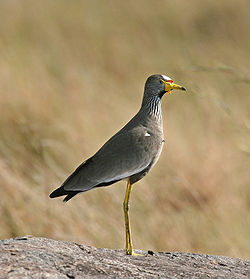Portal:Africa



Africa is the world's second-largest and second-most populous continent after Asia. At about 30.3 million km2 (11.7 million square miles) including adjacent islands, it covers 20% of Earth's land area and 6% of its total surface area. With nearly 1.4 billion people as of 2021, it accounts for about 18% of the world's human population. Africa's population is the youngest among all the continents; the median age in 2012 was 19.7, when the worldwide median age was 30.4. Based on 2024 projections, Africa's population will exceed 3.8 billion people by 2100. Africa is the least wealthy inhabited continent per capita and second-least wealthy by total wealth, ahead of Oceania. Scholars have attributed this to different factors including geography, climate, corruption, colonialism, the Cold War, and neocolonialism. Despite this low concentration of wealth, recent economic expansion and a large and young population make Africa an important economic market in the broader global context, and Africa has a large quantity of natural resources.
Africa is highly biodiverse; it is the continent with the largest number of megafauna species, as it was least affected by the extinction of the Pleistocene megafauna. However, Africa is also heavily affected by a wide range of environmental issues, including desertification, deforestation, water scarcity, and pollution. These entrenched environmental concerns are expected to worsen as climate change impacts Africa. The UN Intergovernmental Panel on Climate Change has identified Africa as the continent most vulnerable to climate change.
The history of Africa is long, complex, and varied, and has often been under-appreciated by the global historical community. In African societies the oral word is revered, and they have generally recorded their history via oral tradition, which has led anthropologists to term them "oral civilisations", contrasted with "literate civilisations" which pride the written word. African culture is rich and diverse both within and between the continent's regions, encompassing art, cuisine, music and dance, religion, and dress.
Africa, particularly Eastern Africa, is widely accepted to be the place of origin of humans and the Hominidae clade, also known as the great apes. The earliest hominids and their ancestors have been dated to around 7 million years ago, and Homo sapiens (modern human) are believed to have originated in Africa 350,000 to 260,000 years ago. In the 4th and 3rd millennia BCE Ancient Egypt, Kerma, Punt, and the Tichitt Tradition emerged in North, East and West Africa, while from 3000 BCE to 500 CE the Bantu expansion swept from modern-day Cameroon through Central, East, and Southern Africa, displacing or absorbing groups such as the Khoisan and Pygmies. Some African empires include Wagadu, Mali, Songhai, Sokoto, Ife, Benin, Asante, the Fatimids, Almoravids, Almohads, Ayyubids, Mamluks, Kongo, Mwene Muji, Luba, Lunda, Kitara, Aksum, Ethiopia, Adal, Ajuran, Kilwa, Sakalava, Imerina, Maravi, Mutapa, Rozvi, Mthwakazi, and Zulu. Despite the predominance of states, many societies were heterarchical and stateless. Slave trades created various diasporas, especially in the Americas. From the late 19th century to early 20th century, driven by the Second Industrial Revolution, most of Africa was rapidly conquered and colonised by European nations, save for Ethiopia and Liberia. European rule had significant impacts on Africa's societies, and colonies were maintained for the purpose of economic exploitation and extraction of natural resources. Most present states emerged from a process of decolonisation following World War II, and established the Organisation of African Unity in 1963, the predecessor to the African Union. The nascent countries decided to keep their colonial borders, with traditional power structures used in governance to varying degrees. (Full article...)
Selected article –

Lalibela (Amharic: ላሊበላ, romanized: Lalibäla) is a town in the Amhara Region of Ethiopia. Located in the Lasta district and North Wollo Zone, it is a tourist site for its famous rock-cut monolithic churches designed in contrast to the earlier monolithic churches in Ethiopia. The whole of Lalibela is a large and important site for the antiquity, medieval, and post-medieval civilization of Ethiopia. To Christians, Lalibela is one of Ethiopia's holiest cities, and a center of pilgrimage.
Ethiopia was one of the earliest nations to adopt Christianity in the first half of the 4th century, and its historical roots date to the time of the Apostles. The churches themselves date from the 7th to 13th centuries, and are traditionally dated to the reign of the Zagwe (Agaw) king Gebre Meskel Lalibela (r. c. 1181–1221). (Full article...)
Featured pictures –
Did you know (auto-generated) -

- ... that activist Gerlin Bean co-founded the Organisation of Women of African and Asian Descent in 1978, an event described as "a watershed in the history of Black women's rights activism"?
- ... that in 2022, Four Hundred Souls: A Community History of African America was a finalist for both an Andrew Carnegie Medal for Excellence in Nonfiction and an Audie Award for Multi-voiced Performance?
- ... that many African countries provide for legal abortion in their reproductive health laws, but such laws have been passed without grounds for legal abortion in Madagascar and in Senegal?
- ... that the 1862 Brooklyn riot involved a mob mainly comprising Irish Americans targeting African-American workers at a tobacco factory?
- ... that land for a library built for African Americans in Virginia was donated by Pope Pius XII?
- ... that opera singer Charles Holland spent much of his career in Europe as opportunities in classical music for African Americans were limited?
Categories
Selected biography –

Didier Drogba is a former professional association footballer who represented the Ivory Coast national team from 2002 to 2014. He made his debut for the Ivory Coast in a 2004 African Cup of Nations qualification match against South Africa in September 2002. He scored his first international goal on his next appearance for the Ivory Coast, in a 3–0 win against Cameroon in a friendly in Châteauroux, France. On 8 August 2014, Drogba announced his retirement from international football with a record of 65 goals in 105 appearances, ending his international career as his country's all-time top scorer, remaining so as of November 2018[update], and with the third-most appearances, behind Didier Zokora (123) and Kolo Touré (120).
Drogba scored one hat-trick during his international career, scoring the opening three goals in a 6–1 victory for the Ivory Coast against Burundi in a 2004 African Cup of Nations qualification match. He has also scored a goal twice in a match on twelve occasions, including one against Senegal in October 2012; the game was abandoned shortly after Drogba's second goal as fans rioted, throwing food and drinks onto the pitch, although the Confederation of African Football declared the 2–0 victory would stand. He has scored more goals against Benin (seven) than any other country. Nineteen of his goals were scored in his hometown stadium of Stade Félix Houphouët-Boigny in Abidjan. Fourteen of Drogba's goals were scored from the penalty spot. (Full article...)
Selected country –
 |

|
|

| ||
Botswana, officially the Republic of Botswana (Tswana: Lefatshe lo Botswana), is a landlocked nation in Southern Africa. Citizens of Botswana are Batswana (singular: Motswana), regardless of ethnicity. Formerly the British protectorate of Bechuanaland, Botswana adopted its new name after becoming independent within the Commonwealth on 30 September 1966. Bordered by South Africa to the south and southeast, Namibia to the west, Zambia to the north, and Zimbabwe to the northeast, it is divided into nine districts, which are further subdivided into a total twenty-eight subdistricts.
For over 30 years, Botswana had the fastest growing economy in the world, with growth averaging over 9% per year from 1966 to 1999. The economy, closely tied to South Africa's, is dominated by mining (38 percent), services (44 percent), construction (7 percent), manufacturing (4 percent) and agriculture (2 percent). Botswana has been hit very hard by the AIDS epidemic; the average life expectancy in Botswana at birth has declined from 64 years in 1990 to 50.6 years in 2007. (Read more...)
Selected city –
Cape Town is the legislative capital of South Africa. It is the country's oldest city and the seat of the Parliament of South Africa. Cape Town is the country's second-largest city, after Johannesburg, and the largest in the Western Cape. The city is part of the City of Cape Town metropolitan municipality.
The city is known for its harbour, its natural setting in the Cape Floristic Region, and for landmarks such as Table Mountain and Cape Point. In 2014, Cape Town was named the best place in the world to visit by The New York Times, and was similarly ranked number one by The Daily Telegraph in both 2016 and 2023. (Full article...)
In the news
- 17 April 2025 – Somali Civil War
- 2025 Shabelle offensive, American military intervention in Somalia
- U.S. airstrikes kill twelve al-Shabaab insurgents in central Somalia, while a separate airstrike destroys an unflagged vessel suspected of carrying weapons for the militant group off the Somali coast. (Reuters) (Middle East Monitor)
- 16 April 2025 – Somali Civil War
- Al-Shabaab militants capture the Adan Yabal District in Middle Shabelle, Somalia, as the group continues to advance towards the capital Mogadishu. (Reuters)
- 16 April 2025 –
- The HB Kongolo traveling from Matankumu to Bolomba, carrying around 400 people, catches fire and capsizes on the Congo River near Mbandaka, Democratic Republic of the Congo, killing at least 50 people and leaving hundreds more missing. (AP)
- 16 April 2025 – Sudanese civil war
- The leader of the Sudanese Rapid Support Forces, Mohamed Hamdan Dagalo, announces the establishment of the Government of Peace and Unity, a rival government to the country's armed forces. (BBC News)
- 15 April 2025 – Sudanese civil war, Foreign aid to Sudan
- Humanitarian impact of the Sudanese civil war
Updated: 23:05, 17 April 2025
General images -
Africa topics
More did you know –
- ... that Safi Faye's 1975 film Kaddu Beykat was the first commercially distributed feature film made by a Sub-Saharan African woman?
- ... that legendary princess Yennenga, the "mother" of the Mossi people, was such a great warrior that her father refused to allow her to marry?
- ... that Safi Faye is a Senegalese film director whose work is better known in Europe than in her native Africa?
- ...that Mohamed Camara's 1997 film Dakan was the first West African film to explore homosexuality?
Related portals
Major Religions in Africa
North Africa
West Africa
Central Africa
East Africa
Southern Africa
Associated Wikimedia
The following Wikimedia Foundation sister projects provide more on this subject:
-
Commons
Free media repository -
Wikibooks
Free textbooks and manuals -
Wikidata
Free knowledge base -
Wikinews
Free-content news -
Wikiquote
Collection of quotations -
Wikisource
Free-content library -
Wikispecies
Directory of species -
Wikiversity
Free learning tools -
Wikivoyage
Free travel guide -
Wiktionary
Dictionary and thesaurus


























































































